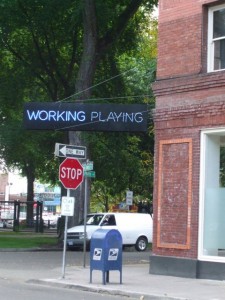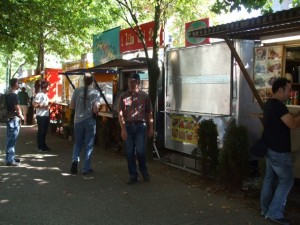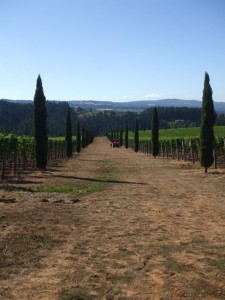
Stereotypes of urban groups are well-known: hipsters, yuppies, DINKs, soccer moms. Writers exaggerate them for comic effect: we’re all familiar with the suburban family (starting way back with Leave it to Beaver), the glamorous single girls (Sex in the City), and the teen misfits (Degrassi, Glee). Urban cultures are also contrasted: in Hot in Cleveland, four L.A. women decide to move to Cleveland when the local men show a lot of interest in them. In real life, there’s practically a cultural divide between the urban lifestyles of Toronto and Vancouver, or New York and L.A.
Portland can be characterized as a West Coast city, with its attention to local food, emphasis on physical activity, and enormous variety of independent retailers. You’ve all seen the video clip by now: a couple of hipsters grill a waitress about just how local their chicken is, and are presented with every minute detail of their dinner’s upbringing, habitat size and even its name. The series Portlandia has become somewhat of a cult classic in its portrayal of overzealous hipster culture: it parodies fixi bikes, facial hair, animal protection, and independent bookstores. My first visit to Portland occurred last week, before I’d seen a single episode of the show. So how do Portlanders measure up to their stereotypes?
Many have written about Portland’s devotion to public transit and urban planning initiatives, including the urban growth boundary adopted in 1976. To the tome of articles written on this topic, I have nothing more to add: I also found travelling in Portland quite easy thanks to the streetcar, which extends to the northwest neighbourhood where I was staying, and the MAX LRT lines. I could walk to the Pearl District, home to many independent shops including the legendary Powell’s Books. But I suspect that I got to know Portland in somewhat of a unique way: through food. Specifically, gluten-free food.

Travelling with dietary restrictions can be brutal, especially if we’re talking about allergies or other life-threatening conditions, as opposed to our militant foodies in Portlandia’s pilot episode. Put a couple of these conditions together and it can be really difficult to find anything to nosh: I vividly recall planning a high school camping trip with a vegetarian, a celiac, and a dairy allergic among our party of six. Now, in Vancouver there’s no shortage of restaurants catering to every dietary need (or people with dietary needs). Recently, my husband and I went to a gluten-free dinner at Whole Foods to learn recipes that he can safely eat. There, we met two women who blog on gluten-free restaurants and products in Vancouver (glutenfree-vancouver.blogspot.com). Based on this experience, we decided to search for a similar website on Portland. And there it was: Gluten Free Portland (www.glutenfreeportland.org). Thanks to their restaurant list and Google maps, we were able to find places all over the city that met my husband’s celiac needs: in fact, we wanted to try the restaurants so much that we actually explored neighbourhoods that we probably wouldn’t have, including the Hawthorne District and the Belmont area.

The neighbourhoods are Portland, with main streets full of shops, restaurants, and food carts that have more or less become permanent installations: one coffee cart had an attached seating area with stools and a corrugated plastic roof. There were even “pods” of food carts with four or five vendors in a row. We feasted on fried yucca and quinoa-breaded shrimp, drank hazelnut milk, and tasted the local wines. These folks do, indeed, take their food seriously. One restaurant had a cheese menu as extensive than their wine list, mostly sourced from Oregon dairies.
Within 40 minutes of Portland, wineries share the land with hazelnut orchards, grazing horses and alpacas, corn fields, and dairy farms. I doubt that any of this is an accident: the Portland/Multnomah Food Policy Council runs immigrant farmer workshops, completed an inventory of city-owned land available for urban agriculture, awarded Portland State University $125,000 to initiate its Learning Garden Laboratory, and addressed food security in Lents with a grant from the Robert Wood Johnson Foundation.
So is Portland, in fact, Portlandia? Well…yes. At one point, two bearded men in their mid-20s strode towards each other on Belmont, and one said to the other, “Hey man, what it is,” despite the fact that it is not 1971. (My husband and I burst out laughing, as we strode out of yet another gluten-free bakery). The same urban stereotypes can be found in Vancouver, Toronto, London, and Melbourne, but Portlandia writers really know their subject material!
